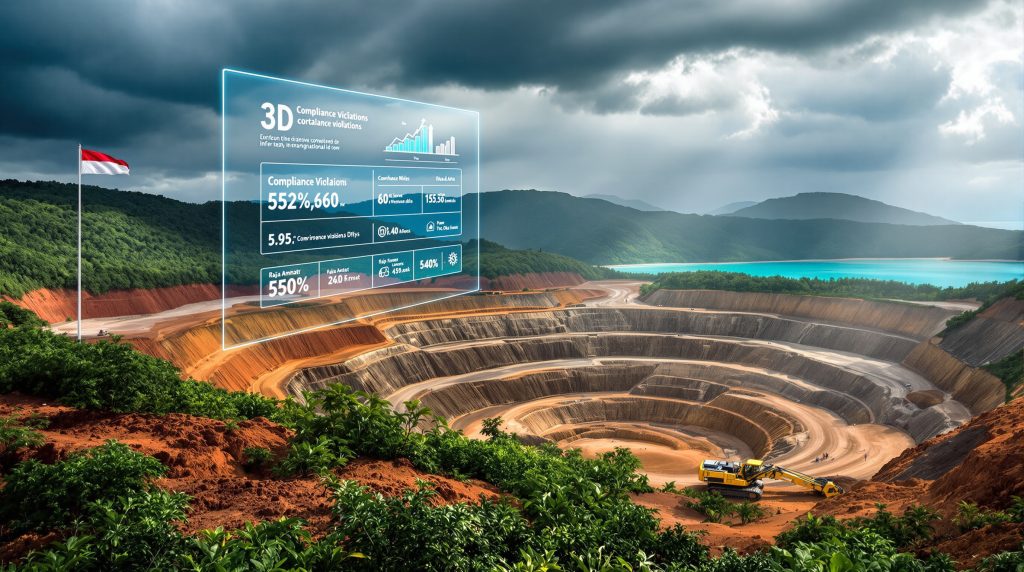Indonesia's Mining Permit Suspension Crisis: Regulatory Enforcement and Environmental Impact
Indonesia's resource management authorities have taken unprecedented regulatory action by suspending 190 mining permits across the country, representing a significant enforcement initiative within the nation's extractive industries sector. This regulatory crackdown emerged following comprehensive evaluations conducted by the Directorate General of Minerals and Coal, which identified numerous compliance failures among permit holders.
The suspensions, announced by Deputy Mining Minister Yuliot Tanjung in September 2025, have sent shockwaves through Indonesia's mining industry, affecting operations across multiple mineral sectors including coal, nickel, gold, and tin. This enforcement action represents approximately 4% of Indonesia's total active mining permits, which numbered over 4,600 as of late 2024.
Timeline of the Regulatory Enforcement
The indonesia mining permits suspension didn't happen overnight but resulted from a series of regulatory actions and evaluations:
- Late 2024: Over 4,600 mining permits were active in Indonesia before the enforcement action
- Early 2025: Implementation of stricter compliance monitoring systems following policy changes
- Mid-2025: Comprehensive evaluation of mining operations conducted by regulatory authorities
- September 2025: Official announcement of 190 permit suspensions by Deputy Mining Minister Yuliot Tanjung
These regulatory actions reflect a growing emphasis on compliance and environmental responsibility in Indonesia's mining sector under the leadership of President Prabowo Subianto.
Geographic Distribution of Suspended Operations
The mining permit suspensions affect operations across multiple regions of Indonesia, with particular impact in areas known for their rich mineral deposits:
- Central Kalimantan: Multiple coal mining operations affected in this resource-rich region
- Southeast Sulawesi: Approximately 25 nickel mining permits suspended in a key nickel-producing area
- North Maluku: Several mineral extraction operations halted in this island province
- Raja Ampat archipelago: Four nickel mining companies had licenses completely revoked due to environmental violations
The geographic distribution of suspended permits highlights both the nationwide scope of the enforcement action and the targeted approach toward environmentally sensitive regions.
Why Were Indonesian Mining Permits Suspended?
The Indonesian government cited multiple regulatory violations as the basis for the widespread suspensions. These enforcement actions reflect President Prabowo Subianto's administration's commitment to addressing longstanding issues in the mining sector.
"The permit suspensions were linked to evaluations of the miners' post-mining land reclamation obligations and for extracting more than their quotas allowed, among other problems," reported state media Antara, citing Deputy Mining Minister Yuliot Tanjung.
Primary Compliance Failures Leading to Suspensions
The suspensions stem from several key compliance failures:
- Environmental Rehabilitation Deficiencies: Many operations failed to meet their post-mining land reclamation obligations, leaving disturbed landscapes unremediated
- Production Quota Violations: Numerous companies were found to be extracting minerals beyond their permitted limits
- Work Plan Non-Compliance: Significant deviations from approved operational frameworks were identified
- Financial Guarantee Inadequacies: Many operations maintained insufficient reclamation and post-mining guarantees
- Environmental Impact Violations: Particularly severe violations were found in ecologically sensitive areas like Raja Ampat
Industry analysts note that while all these violations are technically subject to enforcement under existing regulations, previous administrations had typically been more lenient in their application.
Regulatory Framework Governing Mining Operations
The suspensions represent enforcement of existing regulations rather than new legislation. Indonesia's mining governance operates under a complex framework:
- Law No. 4/2009 on Mineral and Coal Mining (with subsequent amendments)
- Government Regulation No. 23/2010 on Implementation of Mineral and Coal Mining Business Activities
- Ministry of Energy and Mineral Resources Regulations on technical mining requirements
- Environmental Protection and Management Law governing rehabilitation requirements
Understanding this regulatory framework is essential for mining companies operating in Indonesia, as President Prabowo's administration has signaled a more stringent approach to enforcement.
What Are the Consequences for Suspended Mining Operations?
The regulatory action imposes significant operational and financial implications for affected mining companies, while establishing a precedent for future compliance expectations.
For the 190 suspended operations, the immediate consequence is a complete halt to extraction and processing activities, causing substantial revenue disruption. The longer-term impact depends on how quickly these companies can address their compliance issues.
Suspension Terms and Reinstatement Process
For mining companies facing suspension, the path back to operational status involves several key steps:
- Duration: Suspensions may last up to 60 days depending on violation severity
- Monitoring Requirements: Companies must maintain and monitor mining areas during suspension
- Reinstatement Criteria: Submission of compliant reclamation plans and financial guarantees
- Evaluation Process: Regulatory review of corrective actions before permit restoration
Mining operators that fail to satisfy regulatory requirements within the suspension period face the possibility of permanent permit revocation, significantly raising the stakes for swift compliance.
Economic Impact of Mining Suspensions
The suspensions affect multiple mineral sectors critical to Indonesia's export economy:
| Mineral Sector | Approximate Number of Affected Operations | Economic Significance |
|---|---|---|
| Coal | 75+ operations | Major export commodity and domestic energy source |
| Nickel | At least 25 confirmed operations | Critical for stainless steel and EV battery production |
| Gold | Multiple operations affected | High-value export commodity |
| Tin | Several operations | Important industrial mineral |
| Iron Ore | Multiple permits suspended | Essential for domestic steel production |
While the short-term impact on Indonesia's overall mineral export volumes may be moderate, extended suspensions could create more significant disruption in certain mineral supply chains, particularly for nickel and coal.
How Does This Affect Indonesia's Resource Governance Strategy?
The mass suspension represents a significant shift in Indonesia's approach to natural resource management, balancing economic development with environmental protection and regulatory compliance.
President Prabowo Subianto has explicitly "vowed to crack down on the illegal exploitation of natural resources, including in the mining sector," according to reports from state media. This commitment signals a potential long-term shift in Indonesia's approach to resource governance.
President Prabowo's Resource Management Approach
Since taking office, President Prabowo Subianto has signaled a more stringent approach to resource governance, with particular emphasis on:
- Cracking down on illegal exploitation of natural resources
- Strengthening enforcement of existing regulations
- Balancing economic development with environmental protection
- Increasing domestic value addition for mineral resources
This approach represents a continuation and intensification of Indonesia's resource nationalism policies, which have gradually evolved over the past decade.
Broader Regulatory Reforms in Indonesia's Mining Sector
The suspensions occur within a context of evolving mining governance in Indonesia:
- Amendments to Law No. 4/2009: Emphasizing domestic prioritization of minerals
- New Mineral Industry Oversight: Expanded regulatory capacity for strategic minerals
- Environmental Sustainability Focus: Increased emphasis on mine reclamation innovations
- Production Control Mechanisms: Stricter enforcement of approved extraction volumes
These reforms reflect Indonesia's effort to maximize the domestic economic benefit of its mineral resources while addressing environmental concerns and regulatory compliance.
What Makes the Raja Ampat Case Particularly Significant?
Among the regulatory actions, the complete revocation of four nickel mining licenses in Raja Ampat represents a special case with broader implications for environmentally sensitive areas.
The Raja Ampat archipelago, located in West Papua province, is internationally recognized for its exceptional marine biodiversity and stunning landscapes. The government's decision to permanently revoke mining licenses in this region signals a potential shift in priorities for environmentally significant areas.
Environmental Significance of Raja Ampat
Raja Ampat holds unique environmental importance:
- Global Biodiversity Hotspot: Home to approximately 75% of known coral species globally
- Marine Ecosystem Value: Contains some of the world's most diverse reef systems
- Tourism Economic Value: Generates significant revenue through eco-tourism
- Scientific Importance: Critical research site for marine biodiversity
These environmental values appear to have influenced the government's decision to apply more severe penalties to mining operations in this region.
Differential Treatment of Mining Operations
The government's approach to Raja Ampat demonstrates nuanced regulatory decision-making:
- Four Private Operators: Complete license revocations due to environmental violations
- Operations Outside Protected Zones: Differential treatment based on specific location
- Stricter Standards: Higher compliance requirements in ecologically sensitive regions
- Precedent Setting: Establishes that environmental protection can override economic interests
This differentiated approach suggests that Indonesia's regulatory authorities are developing a more sophisticated framework that considers both economic and environmental factors in their enforcement decisions.
How Will This Affect Indonesia's Mining Industry Future?
The regulatory enforcement signals potential long-term changes in Indonesia's approach to mining governance, with implications for both domestic and international investors.
For the mining industry as a whole, these suspensions serve as a clear warning that compliance with existing regulations is no longer optional. Companies operating in Indonesia must adapt to this new regulatory reality or risk significant operational disruption.
Anticipated Industry Adjustments
Mining companies operating in Indonesia will likely implement several changes:
- Enhanced environmental compliance programs to prevent violations
- Increased investment in reclamation technologies and approaches
- More conservative production planning to avoid quota violations
- Stronger community engagement programs to build social license
- Proactive regulatory relationship management to navigate compliance requirements
These adjustments will require additional investment but may ultimately lead to more sustainable mining practices across the industry.
Investment Climate Implications
The suspensions send mixed signals to potential investors:
- Regulatory Risk Increase: Higher compliance costs and potential for operational disruptions
- Environmental Standards Elevation: Need for more sophisticated environmental management
- Selective Opportunity Creation: Advantage for operators with strong compliance capabilities
- Policy Predictability Concerns: Questions about consistency of regulatory enforcement
For international investors, these developments emphasize the importance of thorough due diligence and strong compliance capabilities when considering mining investments in Indonesia.
What Environmental Protection Measures Are Required?
The suspensions highlight specific environmental compliance requirements that mining operations must meet to maintain their permits.
Understanding these requirements is essential for mining companies seeking to avoid regulatory action. The government's focus on environmental rehabilitation suggests this will be a continuing priority for Indonesia's mining regulators.
Post-Mining Reclamation Requirements
Mining operations in Indonesia must implement comprehensive reclamation programs:
- Progressive Rehabilitation: Concurrent reclamation during active mining operations
- Topsoil Management: Preservation of valuable topsoil for future restoration
- Native Vegetation Restoration: Reestablishment of indigenous plant communities
- Water Management Systems: Prevention of acid mine drainage and water contamination
- Monitoring Programs: Long-term environmental impact assessment and management
Implementing these requirements effectively requires specialized expertise and significant financial resources, creating potential barriers for smaller mining operations.
Financial Assurance Mechanisms
To ensure funds are available for environmental rehabilitation, Indonesia requires:
- Reclamation Guarantees: Financial instruments ensuring funds for rehabilitation
- Post-Mining Guarantees: Extended financial assurance for long-term environmental management
- Performance Bonds: Securities tied to environmental compliance metrics
- Trust Funds: Dedicated financial resources for rehabilitation activities
These financial assurance requirements represent a significant compliance cost for mining operations but are essential to ensure environmental liabilities are properly addressed.
How Does Indonesia Compare to Other Mining Jurisdictions?
Indonesia's regulatory enforcement places it among countries implementing stricter mining governance, though with distinctive characteristics reflecting its development priorities.
Comparing Indonesia's approach to other major mining jurisdictions provides valuable context for understanding its regulatory direction.
Global Mining Governance Comparison
| Country | Regulatory Approach | Environmental Standards | Enforcement Mechanism |
|---|---|---|---|
| Indonesia | Permit-based with production controls | Increasingly stringent | Direct permit suspensions |
| Australia | Risk-based regulatory framework | High standards with detailed requirements | Financial penalties and permit conditions |
| Canada | Provincial jurisdiction with federal oversight | Stringent with indigenous consultation | Court enforcement and financial assurances |
| Chile | Concession-based system | Moderate with increasing standards | Administrative sanctions |
| South Africa | Rights-based with social requirements | Moderate with community focus | Administrative and criminal penalties |
This comparison reveals that while Indonesia's environmental standards are still developing compared to some advanced economies, its enforcement mechanisms are relatively direct and potentially more immediately impactful.
Indonesia's Distinctive Regulatory Features
Several characteristics distinguish Indonesia's mining governance approach:
- Resource Nationalism: Strong emphasis on domestic processing requirements
- Production Controls: Direct regulation of extraction volumes
- State Participation: Strategic role for state-owned enterprises
- Environmental-Economic Balance: Evolving approach to sustainable development
These distinctive features reflect Indonesia's status as a resource-rich developing economy seeking to maximize the domestic benefits of its natural resources.
What Should Mining Companies Do to Maintain Compliance?
Mining operators in Indonesia must implement comprehensive compliance strategies to avoid permit suspensions and maintain operational continuity.
Proactive compliance management represents the most effective approach to navigating Indonesia's increasingly stringent regulatory environment.
Essential Compliance Strategies
Mining companies should consider implementing these key strategies:
- Conduct regular internal compliance audits against all permit conditions
- Implement progressive rehabilitation programs rather than end-of-life reclamation
- Establish robust production monitoring systems to prevent quota violations
- Maintain transparent communication with regulatory authorities
- Invest in community development programs to build social license
- Develop comprehensive environmental management systems
- Maintain adequate financial provisions for reclamation obligations
Each of these strategies addresses specific compliance risks that could otherwise lead to regulatory action.
Best Practices from Compliant Operators
Some mining companies in Indonesia have successfully navigated the regulatory environment by:
- Integrating rehabilitation into mine planning from project inception
- Regular stakeholder engagement with communities and regulators
- Implementation of international environmental management standards
- Transparent sustainability reporting and impact disclosure
- Investment in innovative rehabilitation technologies
These best practices not only reduce regulatory risk but can also create competitive advantages through improved stakeholder relationships and operational efficiencies.
FAQ: Indonesia's Mining Permit Suspensions
How long will the mining permit suspensions remain in effect?
Most suspensions are expected to last up to 60 days, though the duration depends on how quickly companies address compliance issues. Operations that fail to implement required changes may face extended suspensions or permanent license revocations, similar to other mining halt precedent.
Can suspended mining companies continue any operations during the suspension period?
While active extraction and processing operations must cease, companies are still required to maintain environmental monitoring, security, and essential maintenance activities at mining sites during the suspension period, much like other halted mining operations globally.
How will these suspensions affect Indonesia's mineral export volumes?
The short-term impact on export volumes is expected to be moderate, as the 190 suspended operations represent less than 5% of Indonesia's total mining permits. However, if suspensions extend beyond the initial period or expand to more operations, more significant export disruptions could occur.
Are foreign-owned mining operations treated differently than domestic companies?
The regulatory evaluation process applies the same standards to both foreign and domestic mining operations. However, some analysts note that larger operations with international ownership may have more resources to implement comprehensive compliance programs.
What happens if a mining company fails to address the violations during the suspension period?
Companies that fail to implement required changes face potential permanent license revocation, financial penalties, and possible exclusion from future mining permit applications in Indonesia.
Further Exploration
Indonesia's mining permit suspensions represent a significant development in the country's resource governance approach. The enforcement action highlights the growing importance of environmental compliance and regulatory adherence in one of Southeast Asia's most mineral-rich nations.
As this situation continues to develop, mining companies, investors, and policy analysts will be watching closely to see how Indonesia balances its economic development goals with environmental protection and regulatory enforcement. The outcome of this regulatory action could set important precedents for resource governance across the region and contribute to ongoing industry evolution trends.
For mining operators in Indonesia, the message is clear: regulatory compliance is no longer optional, and the consequences of non-compliance can be swift and significant. Adapting to this new regulatory reality will require investment, expertise, and a genuine commitment to responsible mining practices.
Want to Be First to Discover Major ASX Mineral Opportunities?
Discovery Alert's proprietary Discovery IQ model delivers instant notifications on significant ASX mineral discoveries, giving traders and investors a crucial market edge. Explore how historic discoveries have generated substantial returns by visiting the Discovery Alert discoveries page and start your 30-day free trial today.




